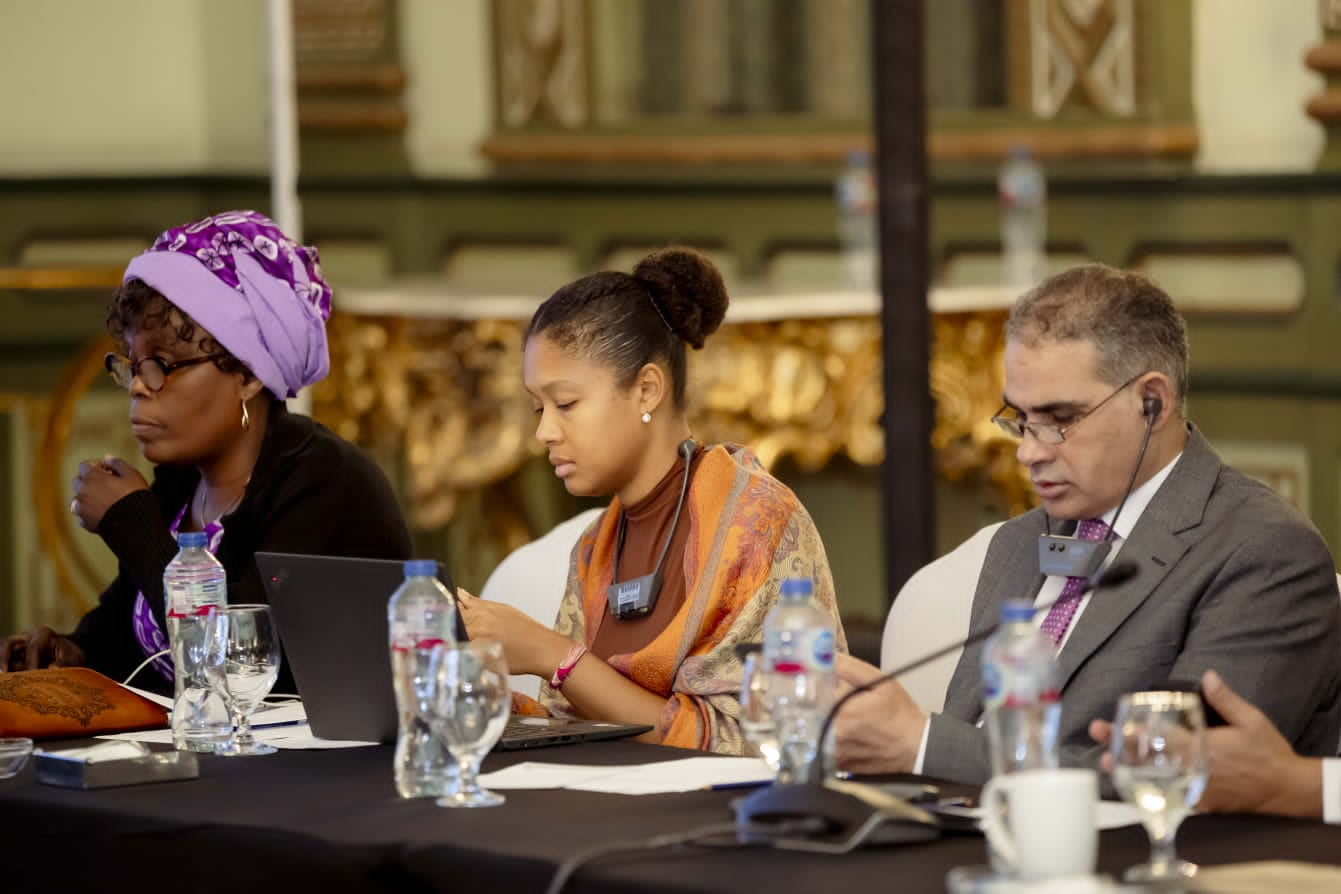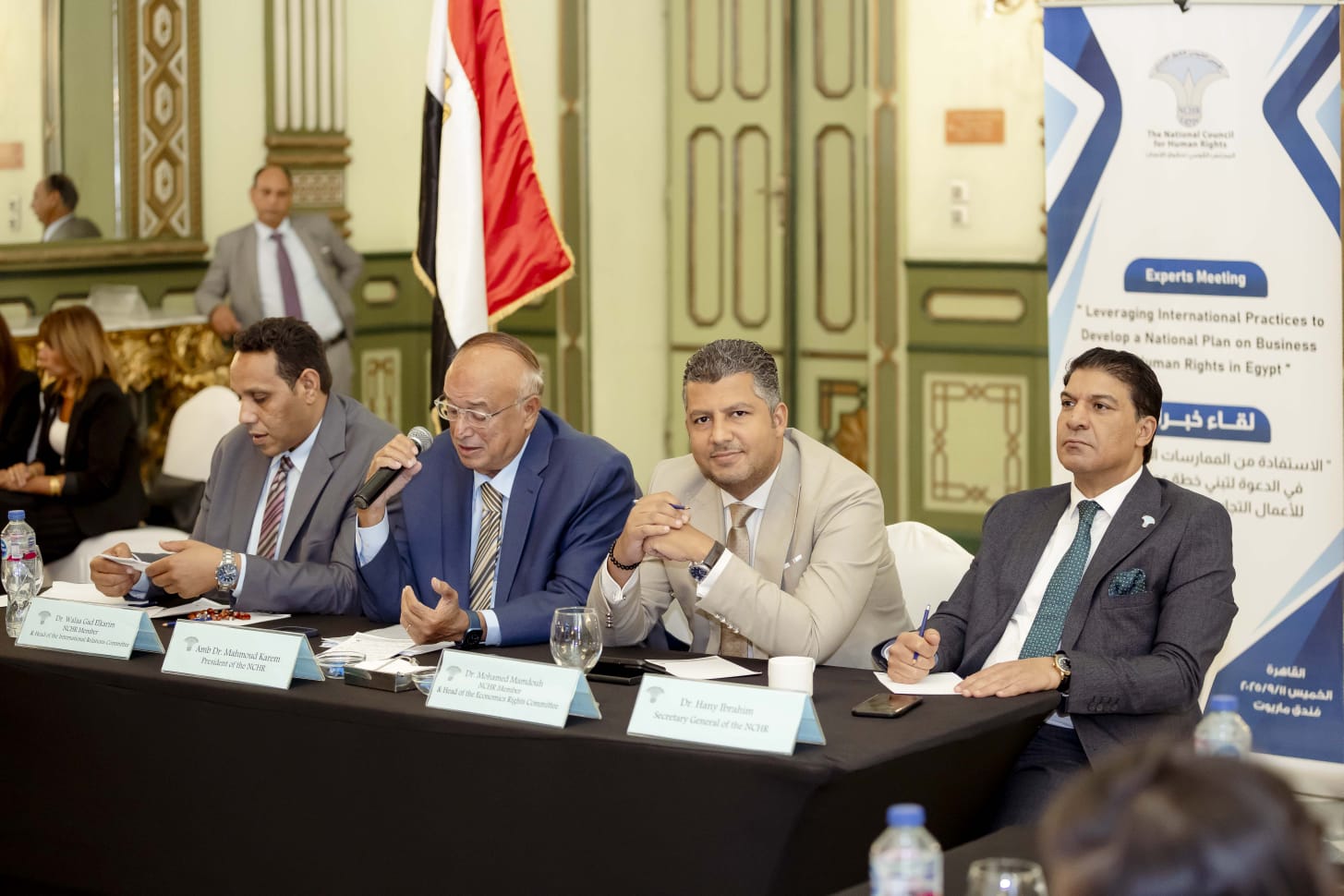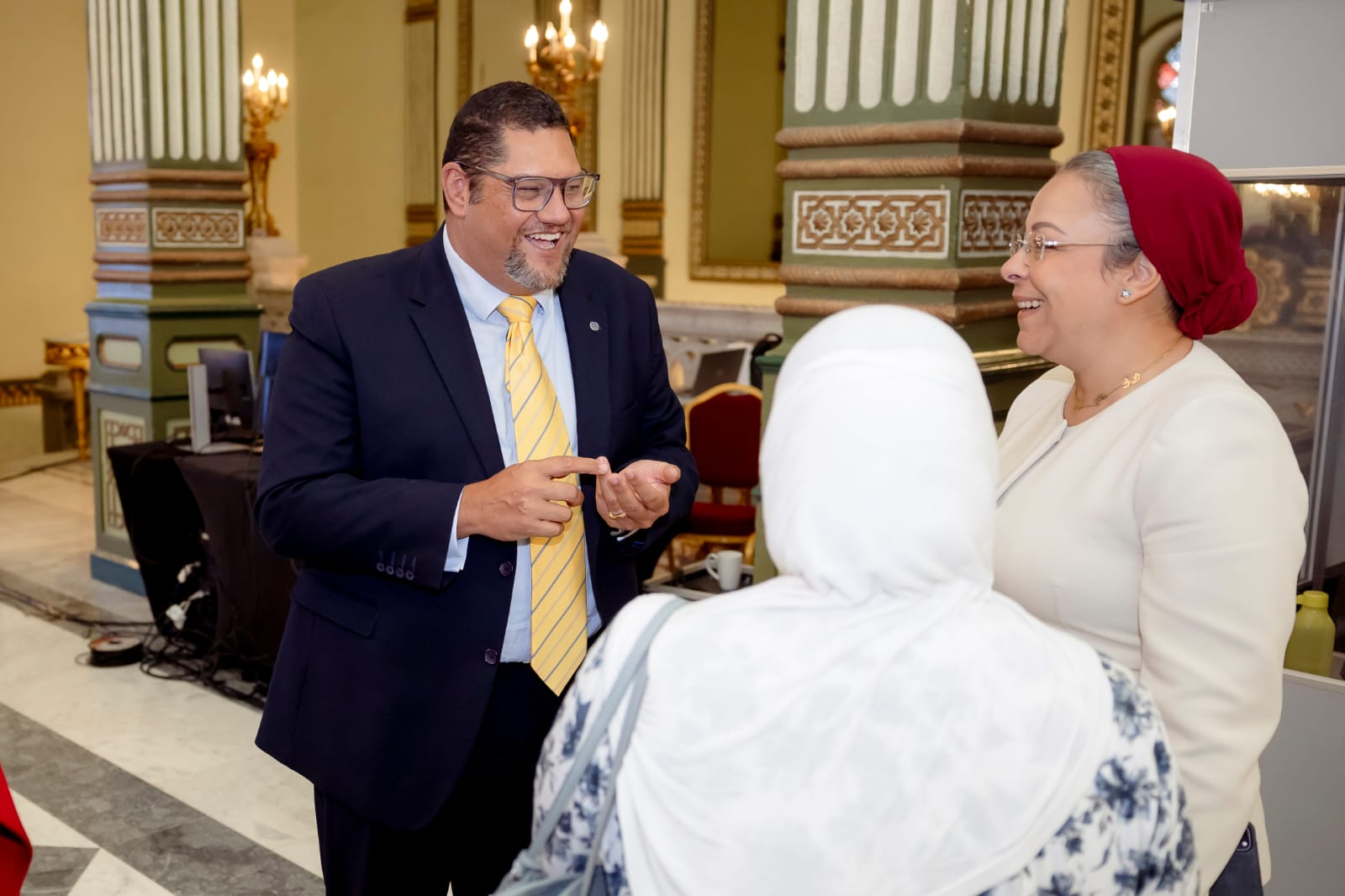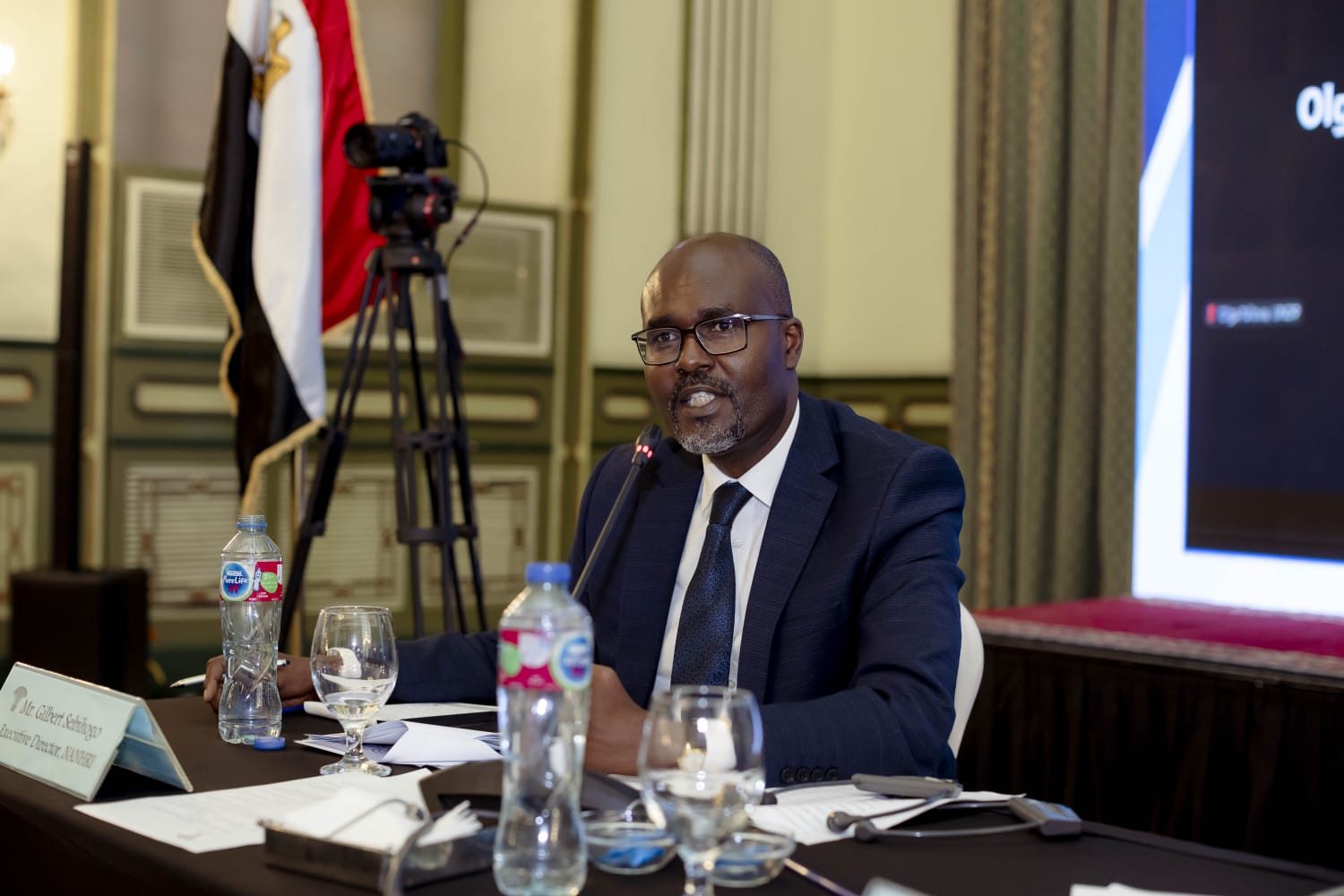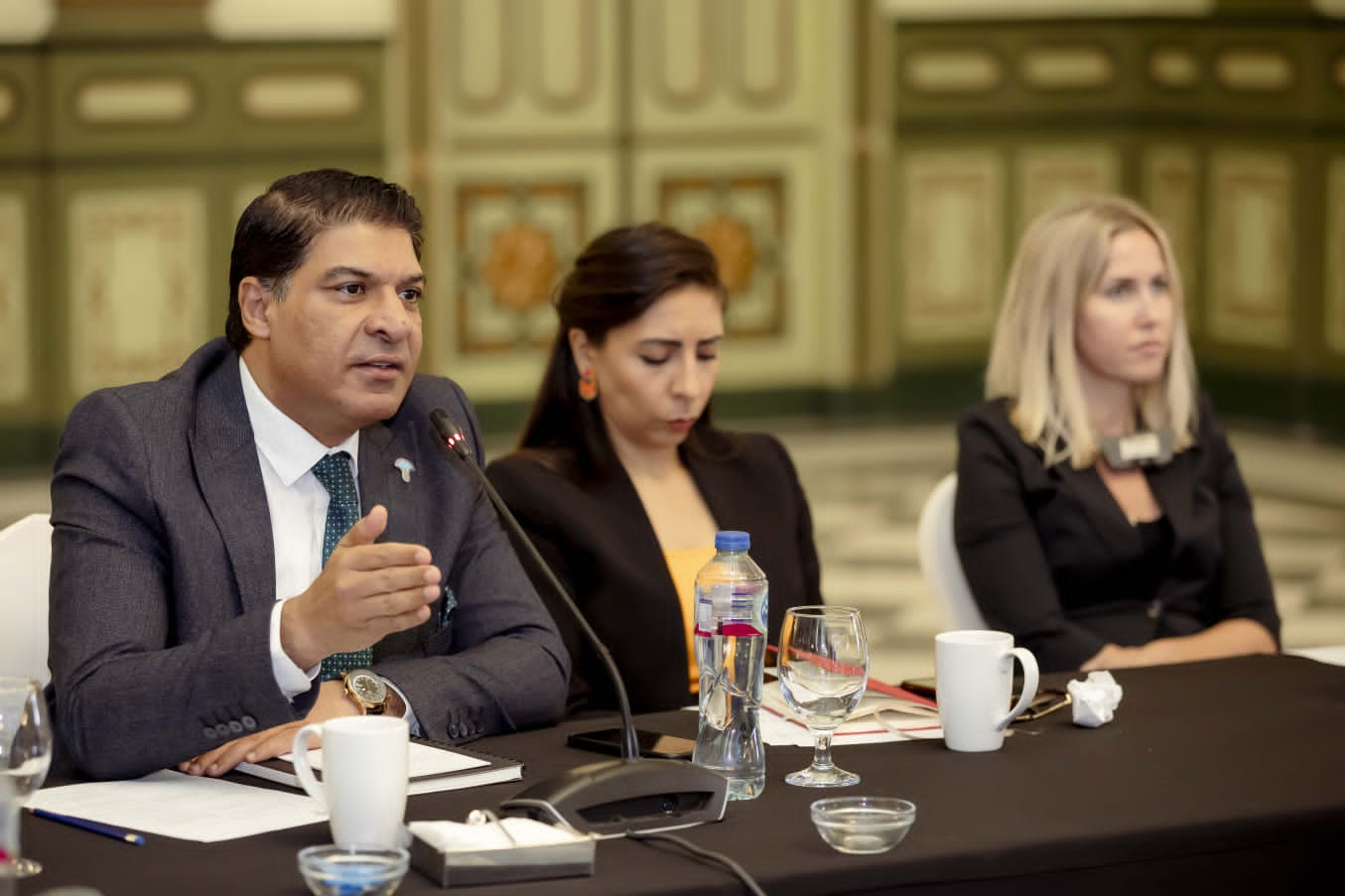NCHR advocates for adoption of national action plan on business and human rights; with participation of high-level international experts
As part of its ongoing commitment to supporting national efforts to advance the respect and protection of human rights in the business sector, the National Council for Human Rights (NCHR) convened a high-level expert consultation in Cairo under the title “Leveraging International Practices to Develop a National Action Plan on Business and Human Rights in Egypt.”
The meeting was chaired by Ambassador Dr. Mahmoud Karem, President of the National Council for Human Rights, with the participation of Dr. Walaa Gad El Kareem, Council Member, Secretary of the International Relations Committee and Focal Point on Business and Human Rights; Dr. Ayman Zohry, Council Member and expert on population and migration issues; Dr. Mohamed Mamdouh, Council Member and Secretary of the Committee on Economic Rights; and Dr. Hany Ibrahim, Secretary-General of the Council.
The event saw high-level contributions from international experts, including Mr. Gilbert Sebihogo, Executive Director of the Network of African National Human Rights Institutions (NANHRI); Ms. Elin Rosenki, Head of the Business, Technology and Human Rights Department at the Danish Institute for Human Rights; Mr. Khaled Ramli, Head of International Relations at the Moroccan National Human Rights Council; Ms. Olga Nilova, Business and Human Rights Specialist at UNDP Geneva; Ms. Fanta Keita, Resource Mobilization Officer at UNICEF; and Ms. Michela Dodini, Business and Human Rights Specialist at the European External Service in Brussels.
Discussions focused on a range of key issues, including national good practices of national human rights institutions in supporting and monitoring the implementation of national action plans on business and human rights; the experiences of international and regional networks in assisting states to develop and operationalize such plans; as well as the presentation and consideration of recommendations and a proposed roadmap for advancing the development of a comprehensive National Action Plan in Egypt.
Opening the meeting, Ambassador Dr. Mahmoud Karem stressed the importance of global efforts to advance the implementation of the United Nations Guiding Principles on Business and Human Rights (UNGPs), noting that they constitute the cornerstone of this process. He underlined Egypt’s accelerated steps towards reinforcing coherence between economic policies and human rights priorities, highlighting the judiciary’s vital role in ensuring accountability and access to remedy in cases related to business activities.
He further emphasized that the National Council for Human Rights, in line with its constitutional mandate and the Paris Principles, works to establish open communication channels with diverse stakeholders, organize inclusive consultations and dialogues, receive and follow up on relevant complaints, and build meaningful partnerships with regional and international organizations.
Ambassador Karem stressed that the Council attaches particular importance to contributing to the development of a National Action Plan on Business and Human Rights, grounded in a comprehensive assessment of the current situation, drawing on leading international experiences, and guided by the principles of participation and transparency to ensure a balanced approach that reconciles economic growth with the protection of fundamental rights.
In his intervention, Dr. Walaa Gad El Kareem emphasized that the primary objective of the meeting was to leverage the vision, experience and practices of international partners and peer institutions to advance the adoption of a National Action Plan on Business and Human Rights in Egypt. He further outlined the Council’s clear roadmap for this work in the coming period, grounded in a participatory approach that prioritizes inclusive dialogue with all stakeholders, including government entities, Parliament, the private sector, civil society, and academia.
He added that this vision seeks to build on good practices in the areas of sustainability, governance, and corporate social responsibility already embraced by wide sectors of business entities and regulatory authorities, with the aim of developing an effective national framework on business and human rights.
For his part, Mr. Gilbert Sebihogo, Executive Director of NANHRI, underscored the importance of integrating human rights principles into national business and human rights plans, while encouraging governments to adopt and implement such plans in partnership with all stakeholders. He further emphasized the necessity of establishing clear monitoring and follow-up mechanisms to ensure their effectiveness and sustainability.
Mr. Sebihogo commended the National Council for Human Rights for organizing this high-level consultation, which brought together representatives of civil society, the private sector, and national and international actors in a participatory dialogue—a key element for the success of any national plan. He welcomed Egypt’s inclusion of the private sector in its strategic vision, noting that Egypt’s Vision 2030 places strong emphasis on the role of business in sustainable development, consistent with Africa’s Agenda 2063, which positions people and development at the heart of its priorities.
He underlined that the success of Egypt’s National Action Plan requires consideration of national challenges, the provision of adequate financial resources, and the establishment of monitoring mechanisms with clear indicators that promote transparency and accountability. In conclusion, he reaffirmed NANHRI’s commitment to providing technical assistance and sharing accumulated expertise to support Egypt in its efforts to strengthen respect for human rights and advance sustainable development.
Participants collectively stressed the importance of exchanging experiences and drawing on best international and regional practices in the field of business and human rights, to inform the development of a comprehensive National Action Plan aligned with international standards and responsive to national priorities. This step marks a milestone in strengthening the State’s commitment to the UNGPs and supporting national efforts towards sustainable development rooted in respect for rights and freedoms.
This high-level meeting marks the beginning of a broader consultative process that will be followed by a series of dialogues and engagements with stakeholders, aimed at generating practical recommendations to be submitted to the relevant state institutions. These contributions are intended to inform the development of a national strategy for integrating human rights principles into the business sector, thereby strengthening transparency and accountability and establishing the foundations of a comprehensive national vision that reconciles development priorities with the respect for
human rights.





 English
English
 Arabic
Arabic
 French
French





